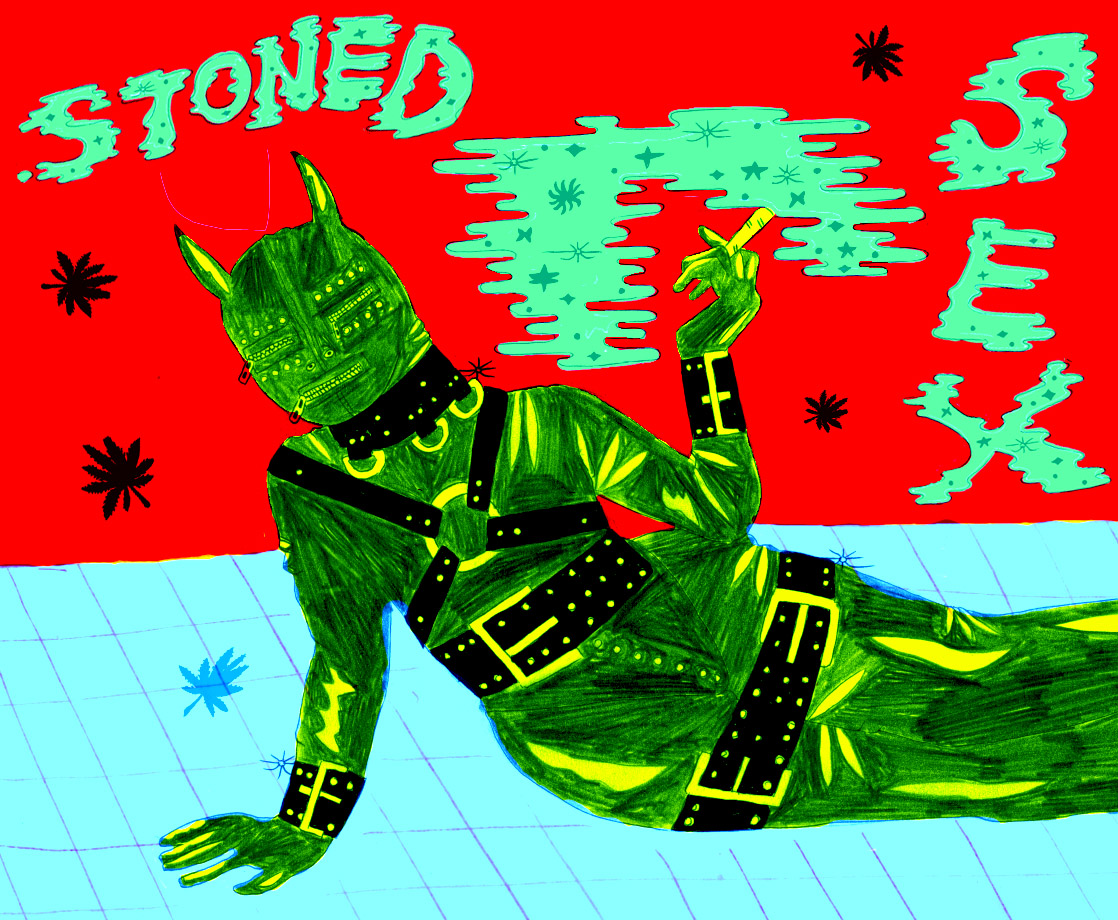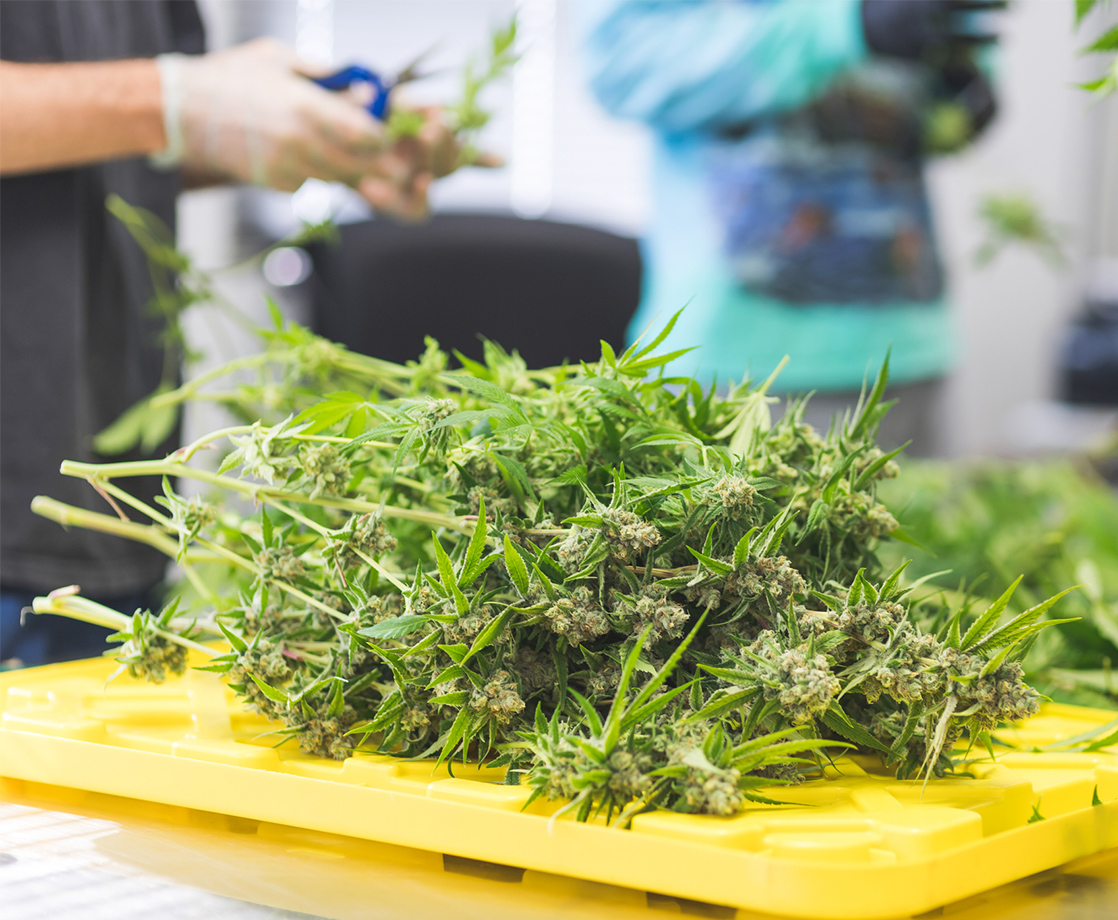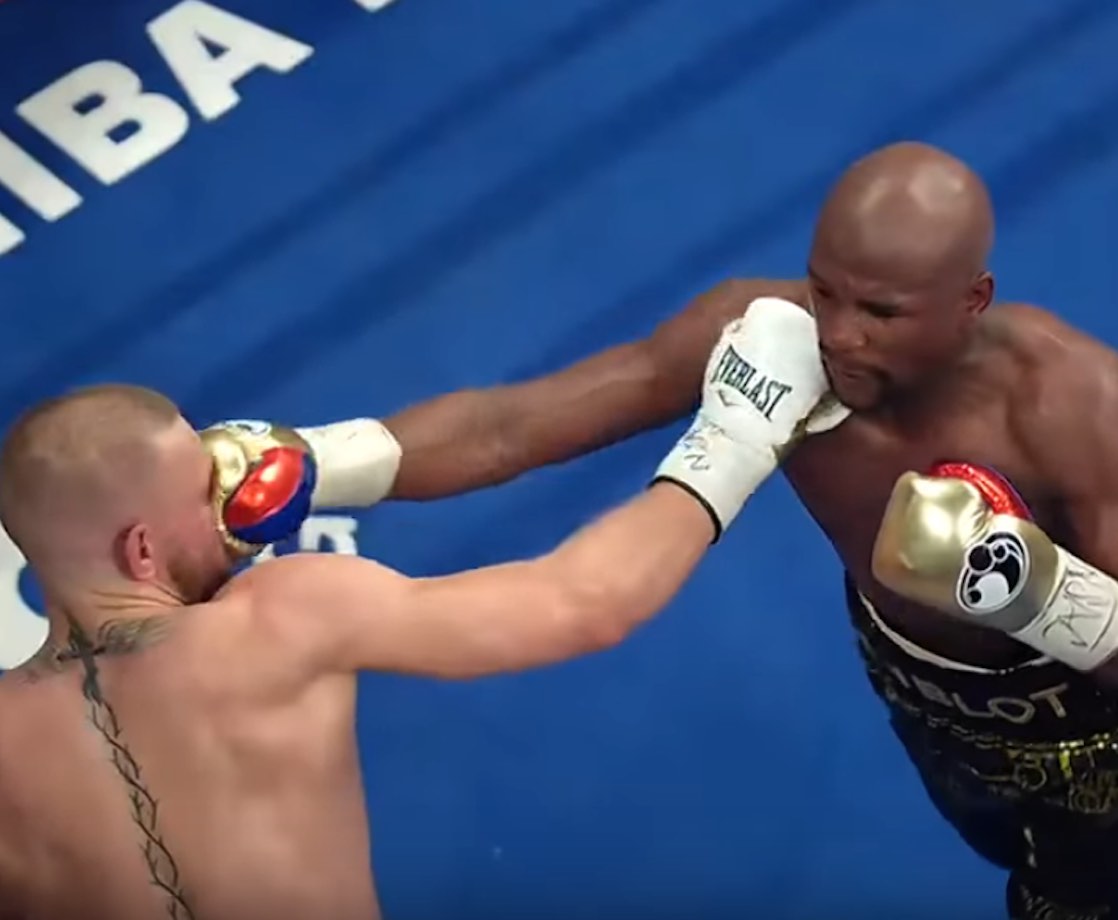*Last name withheld to protect identities
The ability to enjoy sex, kink, and pleasure is your birthright, despite the narratives a sex-negative patriarchal society wants you to believe. “Sexuality is an integral part of ourselves,” said Dr. Holly Richmond, PhD, a somatic psychologist and certified sex therapist who works with patients to regain their kink life through using cannabis. But when you have a chronic illness, understanding that birthright can sometimes get lost.
Bre Ulrich, known as “Baby Fangs” in the kink scene, nearly lost that part of her due to chronic illness. Kink is an umbrella term that refers to any sexual play beyond the vanilla (not kinky) heteronorm. Think of bondage, adult diapers, nipple clamps, golden showers, and playing with knives. You know — the fun stuff. While all sex can get sweaty and emotional, sitting in a cage for hours waiting for your mistress to take you out tends to be more labor-intensive than casual missionary. For many, kink is a crucial part of their identity, so it sucks when all of a sudden you can’t wear a latex straitjacket like you used to due to chronic illness.
“Depression and anxiety are pretty common in lupus patients,” said Ulrich. “And those two mental behemoths have a funny way of not only making you feel like you’re undesirable, but also an absolute creep for having the kinks you have.”
The CDC loosely defines chronic diseases as “conditions that last one year or more and require ongoing medical attention or limit activities of daily living or both.” Under this definition, PTSD, anxiety, and depression are indeed chronic conditions. Diseases such as Crohn’s or lupus can also trigger anxiety, depression, or PTSD. Six in 10 US adults suffer from chronic illness, and four in 10 have at least two or more. Symptoms can affect your ability to engage in kinky play that’s intrinsic to your identity. However, cannabis is helping people reunite with their sex lives after facing the struggles of chronic disease.
Thankfully, medical marijuana helped Ulrich lasso the kink she thought lupus had destroyed.
It’s a Big Deal When Your Sex Life Changes
Lupus isn’t the only chronic illness that makes you feel like your sexuality’s been zapped from your soul. Mark* is kinky, nonbinary, and queer. He enjoys photography, marijuana, and kinky sex such as impact play, rope bondage, and degradation. Then, in 2014, he was diagnosed with Crohn’s disease.
“Since Crohn’s is chronic and unpredictable, there have been times where I had to cancel dates due to flare-ups,” said Mark. “If I did make it, there was no guarantee I could perform.”
Crohn’s disease causes inflammation of the digestive tract. Symptoms include abdominal pain, severe diarrhea, fatigue, weight loss, and malnutrition. In addition to Crohn’s, Mark has depression, anxiety, and PTSD. Prior to the onset of these conditions, Mark says his kink life was substantially more active and his libido was predictable and consistent. He was sexually active two to three times a week, a figure which dropped to once every few months due to his illnesses. Not being able to express himself sexually due to illness created feelings of isolation.
“If your body has changed in some way, and doesn’t work like it did in the past, it is really alienating for a lot of people,” said Elizabeth Anne Wood, PhD, a sociologist, strategist, and author, to MERRY JANE.
After Mark began using medical marijuana, his libido returned to the point where now he is enjoying kink at least once a month, and he says it’s steadily rising.
Ulrich essentially experienced the same extreme libido deflation as Mark. Lupus, however, is an autoimmune disease that causes your body’s immune system to attack your tissues and organs. It’s difficult to diagnose, and symptoms — like rash, fatigue, joint pain, and more — vary from person to person. She also has depression and anxiety, which are common, comorbid conditions in lupus patients.
“I could play out really rough scenes with a partner one day, and then be in tears the next because they slid their hand the wrong way across my very tender face,” she said. “It was constantly a guessing game. Will I get to enjoy this, or will there be a moment where I am fighting through unpleasurable pain?”
Ulrich also dealt with risks such as excessive bleeding from kink scenes, which previously were fine; too much motion made her sick to her stomach and dizzy to the point of nearly passing out.
“Pulling hair could mean a bald spot, any kind of roughness could cause extreme bruising, and if my muscles were tired, it could mean non-stop shaking or collapsing under my own weight,” she said. “It was scary. I felt like I no longer had control over my body. It’s disheartening to crave but fear sex.”
Reclaiming Kinks with Cannabis
The kink scene is a marginalized sexual community. BDSM, which stands for “bondage and discipline, dominance and submission, and sadism and masochism” is more societally-approved, in part thanks to Fifty Shades of Grey, which is a poor depiction but undeniably brought BDSM to the mainstream.
BDSM is a form of kink, but not all kink is BDSM. BDSM involves a power exchange between a dominant and submissive party. So, although having a thing for garden hoses is kinky (for example), it doesn’t involve a power exchange. Simply put: America is still a largely puritanical place where people are only supposed to have sex to make babies. Other sexual expressions are considered strange and perverted.
It takes resilience and strength to embrace and safely engage in your desires, which are still frowned upon by mainstream society. Often hypocritically, politicians don’t want us having queer orgies, they want straight and silent wedding-night sex to conceive a child.
That’s why an underground community exists around kink, much like the cannabis movement. Both taboo, kink and cannabis are misunderstood, judged, and policed. That makes talking with a professional about your unique health and sexual preferences extremely difficult. In terms of pleasure, most doctors usually lack the openness to handle sex questions from straight, vanilla folks — let alone kinksters who want to know how lupus will impact their ability to engage in knife play without excessive bleeding.
“There are concrete problems people face, like pain or fatigue, that makes the sexual expression they were engaging in [before] difficult to do,” said Wood, PhD. “Lots of patients may not feel comfortable asking for help.”
But more and more patients report re-embodying their kink through the power of cannabis.
“Cannabis has allowed me to relax my mind and body in order to be more comfortable in kink and sex,” Mark said. In addition to treating anxiety and depression, cannabis relieves symptoms of Crohn’s disease.
Just as cannabis helps patients attend events that might normally be overwhelming and taxing (like attending a picnic in the park or a work dinner party) it also helps people bend over a bed so their partner can smack their butt with a flogger.
“My skin handles latex, leather, rope and steel like I’m made of diamond, now. Any pain inflicted is pleasurable and not torturous,” Ulrich said. Cannabis provides anti-inflammation and pain relief, too, which helps her lupus. “I lost the parts of sex and kink that I loved for a long time. I was finally able to find that again because cannabis healed my body in ways western medicine could not. Lupus no longer gets a say in whether or not a safeword is called, thanks to good old Mary Jane.”
The Kink Community is Inherently a Community of Healing
Negotiations are part of kink. Before a scene — the period in which the kinky play goes down — the dominant, submissive, and everyone else involved, goes over what’s okay and what’s off-limits. This is when people disclose if they’re using cannabis to treat a condition. While marijuana is extremely safe, it’s always a good idea to spend extra time reviewing consent when a mind-altering substance is involved. Negotiations also create a natural framework for folks to find creative ways to work around chronic illnesses.
Like many marginalized communities, kinksters create a safe space to fill the void of mainstream education and support surrounding the lifestyle. “The kink community is supportive and consent-driven,” Dr. Richmond says. “Kink is all about diversity and sex positivity. It’s accepting of different abilities.”
Kink, in addition to some good cannabis, can be healing for those with chronic conditions and even offer battle fuel. “If illness is alienating us from our bodies, then anything that can help us connect with our bodies and feel whole is helpful,” said Wood, PhD. “The ability to experience pleasure and intimacy is healing. Kink can help a person experience intimacy, and that intimacy can become a fuel for healing and a source of resilience.”
Follow Sophie Saint Thomas on Twitter, and stay tuned for upcoming editions of “Stoned Sex” exclusively on MERRY JANE











